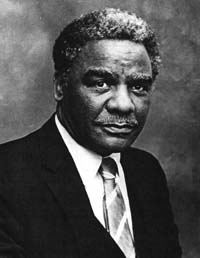 Harold Washington
Although he is chiefly remembered for being the first black to be elected mayor of Chicago,
Harold Washington also served in the House of Representatives following a career as an
attorney and state legislator. He was born in Chicago on April 15, 1922, attending
Forrestville School and DuSable High School before his service with the United States Air
Force Engineers in the Pacific from 1942 to 1946.
In 1949 he received a B.A. from Roosevelt University and earned a J.D. from Northwestern
University's school of law in 1952. In 1954 he succeeded his late father as a precinct captain
in the Third Ward regular Democratic organization. Washington was admitted to the Illinois
bar in 1953 and commenced the practice of law in Chicago, joining the city corporation
counsel's office as an assistant prosecutor from 1954 to 1958.
Beginning in 1960 he served for four years as an arbitrator for the Illinois State Industrial
Commission. In 1965 he entered the state house of representatives, serving until his election
to the state senate in 1976. In a special primary held in 1977 after the death of Richard J.
Daley, Washington finished third in a field of four contenders for the Democratic nomination
for mayor of Chicago.
Washington defeated incumbent Representative Bennett Stewart in the March 1980 primary and was
unopposed in the general election for the House seat. On January 3, 1981, he became a member of
the Ninety-seventh Congress and served on the Committee on Education and Labor, the Committee
on Government Operations, and the Judiciary Committee. During the 1981 budget reconciliation
process, Washington voted "present" rather than agree to an Education and Labor Committee
proposal to cut $11.7 billion form student aid, employment training an child nutrition programs.
On the Judiciary Committee helped negotiate an agreement to extend enforcement sections of the
1965 Voting Rights Act which guaranteed that jurisdictions with a history of voting rights
abuses would be unable to take advantage of the measure's "bail-out" provisions and escape
coverage under the Act. He also voted against authorization of a refugee assistance program
that did not categorize as refugees Haitians who had been detained after entering the United
States illegally.
Washington began his second mayoral campaign in November 1982, shortly after his reelection
to the House, and won the Democratic nomination in the February 1983 primary. Following a
stormy contest that attracted national attention, Washington was elected mayor on April 12,
1983. Three weeks later he resigned form his House seat to take up his mayoral duties. He
died on November 25, 1987, seven months after winning election to a second term.
Harold Washington
Although he is chiefly remembered for being the first black to be elected mayor of Chicago,
Harold Washington also served in the House of Representatives following a career as an
attorney and state legislator. He was born in Chicago on April 15, 1922, attending
Forrestville School and DuSable High School before his service with the United States Air
Force Engineers in the Pacific from 1942 to 1946.
In 1949 he received a B.A. from Roosevelt University and earned a J.D. from Northwestern
University's school of law in 1952. In 1954 he succeeded his late father as a precinct captain
in the Third Ward regular Democratic organization. Washington was admitted to the Illinois
bar in 1953 and commenced the practice of law in Chicago, joining the city corporation
counsel's office as an assistant prosecutor from 1954 to 1958.
Beginning in 1960 he served for four years as an arbitrator for the Illinois State Industrial
Commission. In 1965 he entered the state house of representatives, serving until his election
to the state senate in 1976. In a special primary held in 1977 after the death of Richard J.
Daley, Washington finished third in a field of four contenders for the Democratic nomination
for mayor of Chicago.
Washington defeated incumbent Representative Bennett Stewart in the March 1980 primary and was
unopposed in the general election for the House seat. On January 3, 1981, he became a member of
the Ninety-seventh Congress and served on the Committee on Education and Labor, the Committee
on Government Operations, and the Judiciary Committee. During the 1981 budget reconciliation
process, Washington voted "present" rather than agree to an Education and Labor Committee
proposal to cut $11.7 billion form student aid, employment training an child nutrition programs.
On the Judiciary Committee helped negotiate an agreement to extend enforcement sections of the
1965 Voting Rights Act which guaranteed that jurisdictions with a history of voting rights
abuses would be unable to take advantage of the measure's "bail-out" provisions and escape
coverage under the Act. He also voted against authorization of a refugee assistance program
that did not categorize as refugees Haitians who had been detained after entering the United
States illegally.
Washington began his second mayoral campaign in November 1982, shortly after his reelection
to the House, and won the Democratic nomination in the February 1983 primary. Following a
stormy contest that attracted national attention, Washington was elected mayor on April 12,
1983. Three weeks later he resigned form his House seat to take up his mayoral duties. He
died on November 25, 1987, seven months after winning election to a second term.

 Harold Washington
Harold Washington

Harold Washington